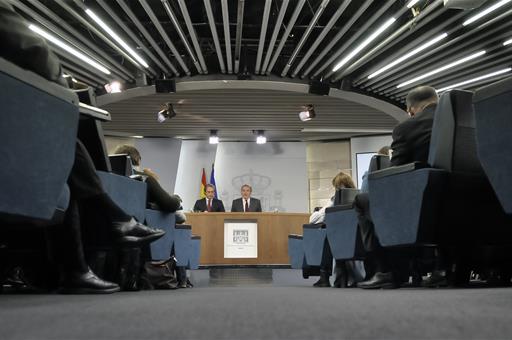Council of Ministers
Government allocates 71 million euros to autonomous regions for education programmes
Council of Ministers - 2017.12.1
Moncloa Palace, Madrid
The government approved a set of agreements through which 70.9 million euros are allocated to the autonomous regions to develop regional cooperation programmes on education.
The programme that receives the most funding - 48 million euros - is designed to facilitate the purchase of text books and learning materials. The Minister for Education, Culture and Sport, and Government Spokesperson, Íñigo Méndez de Vigo, pointed out that this item was removed during the crisis and recovered in 2015 with a provision of 25 million euros, an amount that has now been practically doubled.
Another 20 million euros are allocated to the 'Proeducar' programme, which seeks to reduce the early drop-out rate from schools and to training. The minister highlighted the reduction in the early drop-out rate since the start of the previous legislature - from 26.3% to 18.2%, something "very important for ensuring stable jobs and guaranteeing growth".
The rest of the funds are to be allocated to developing quality actions in Vocational Training and to subsidies for confederations and federations of parents associations.
Íñigo Méndez de Vigo recalled that the Council of Ministers of 10 November approved 321 million euros to implement new cycles of Basic Vocational Training and academic and applied education options in Compulsory Secondary Education. "We are thus talking about almost 400 million euros allocated to cooperation on education".
National Security Strategy
After being debated e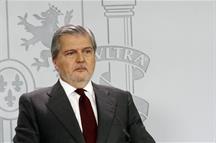 Pool Moncloa / JM Cuadradoarlier on Friday at the National Security Council, the Council of Ministers approved the new National Security Strategy, that will now be presented to the corresponding Joint Upper House-Lower House Committee. This was prepared with participation from all the different ministerial departments, the National Intelligence Centre (Spanish acronym: CNI) and experts and representatives from the academic world and the private sector.
Pool Moncloa / JM Cuadradoarlier on Friday at the National Security Council, the Council of Ministers approved the new National Security Strategy, that will now be presented to the corresponding Joint Upper House-Lower House Committee. This was prepared with participation from all the different ministerial departments, the National Intelligence Centre (Spanish acronym: CNI) and experts and representatives from the academic world and the private sector.
The strategy identifies five priority goals: to develop a comprehensive model of crisis management, to promote a culture of national security, to foster the good use of global common areas, to boost the dimension of security in technology development and to strengthen Spain's international projection.
The Government Spokesperson claimed that this strategy - available on the La Moncloa web page - will allow "Spain to remain at the forefront in security and be prepared to tackle new threats and challenges". Among its new features, he mentioned threats in cyber-space, maritime space and air and underground space.
Regulation on Railway Traffic
The Minister for Public Works, Íñigo de la Serna, claimed that the modification to the Regulation on Railway Traffic, approved on Friday, will improve the security and communication systems affecting rail traffic.
Aimed at increasing security, this will replace the analogical ASFA system with the new digital ASFA system. Íñigo de la Serna explained that ASFA is the automatic signalling and braking system that has been operating in Spain since 1973 that informs engine drivers of the state of the rail signals. This system is used on all lines, except high-speed lines, on which there is a more advanced system of continuous supervision.
The new regulation establishes the obligation that prior to 30 June 2018 all trains have the new digital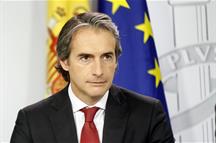 Pool Moncloa / JM Cuadrado ASFA system installed and that by 30 April 2019 this is included on all metric gauge trains, which are the old FEVE (narrow gauge trains) lines.
Pool Moncloa / JM Cuadrado ASFA system installed and that by 30 April 2019 this is included on all metric gauge trains, which are the old FEVE (narrow gauge trains) lines.
The minister also highlighted the progress made on communication systems, with the elimination of the system of telephone blocks used on some lines. "This is a commitment to establishing a plan to improve communications prior to 15 September 2019, after performing a diagnosis of the different lines so that this is fully implemented by 15 January 2024", he said.
High-speed travel on the 'Basque Y'
The Council of Ministers authorised the modification to the agreements signed for the construction of the railway network in the Basque Country, with the aim of incorporating new actions such as the construction of Ezkio station and the halt at Astigarraga, as well as other actions related to improving tunnels and stabilising banks.
Íñigo de la Serna announced that the Government of Spain will allocate 2.34 billion euros to the Regional Government of the Basque Country, in other words, some 700 million euros more than provided for in the agreements signed back in 2006. "This financing will be carried out by reducing the amount corresponding to the Basque Cupo (special tax agreement), such that the amount to be refunded will take into account the amounts already financed and implemented by the Regional Government of the Basque Country".
The Minister for Public Works highlighted that this agreement gives "a decisive boost" towards the high-speed line reaching various cities in the Basque Country by the year 2023.
On another note, the government agreed to put out to tender the railway works to build the stretch from Peralta to Olite on the high-speed line from Zaragoza to Pamplona, which forms part of the development of the Cantábrico-Mediterranean Corridor. Under this agreement, "a huge step will be taken in the construction and progress of high-speed travel in Navarre", stated the minister.
The government also authorised the works to be put out to tender on the integration of the railway line in the area of El Puche (Almeria).
Toll road in La Rioja
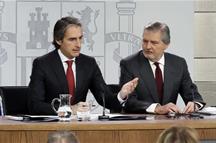 Pool Moncloa / JM CuadradoThe Minister for Public Works also reported on the agreement signed between the State and the Regional Government of La Rioja which establishes, as from Saturday, 2 December, the obligatory diversion of heavy vehicles on the stretch of the N-232 between Zambrana and Tudela heading towards the AP-68.
Pool Moncloa / JM CuadradoThe Minister for Public Works also reported on the agreement signed between the State and the Regional Government of La Rioja which establishes, as from Saturday, 2 December, the obligatory diversion of heavy vehicles on the stretch of the N-232 between Zambrana and Tudela heading towards the AP-68.
Íñigo de la Serna pointed out that the aim of the measure is to reduce the number of fatal accidents on this stretch. The agreement provides for a reduction of up to 75% of the cost of the toll road for heavy vehicles that are diverted between these two towns and of 71% for those that use an optional route that runs between Bilbao and Zaragoza.
The Ministry of Public Works assume 40% of the cost of this action and the Regional Government of La Rioja the remaining 60%.
Draft bill of the Securities Market Act
The Council of Ministers analysed the draft bill of the Securities Market and Financial Instruments Act, which will incorporate into the legal system the Directives of the European Parliament and Council subsequent to the entry into force of the Securities Market Act in the year 1998.
Íñigo Méndez de Vigo explained that the aim of this new legislation is "to ensure high levels of protection for investors of financial products, particularly minority investors, and increase the security, efficiency, good governance and stability of the securities markets".
The new legislation bans the charging of commissions and other incentives when independent financial advisory or portfolio management services are provided. For other investment services, "the quality of the advice must be increased in order to charge for the service and guarantees must be provided of an honest, fair and professional service in line with the interests of customers", specified the Government Spokesperson.
The draft bill also addressed other problems with structured deposits and obliges investment service firms to record their actions in relations with their customers.
Healthcare
The Council of Ministers approved seven agreements to distribute 33.57 million euros t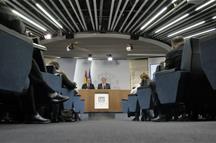 Pool Moncloa / JM Cudradoo autonomous regions to contribute to healthcare policies.
Pool Moncloa / JM Cudradoo autonomous regions to contribute to healthcare policies.
Íñigo Méndez de Vigo referred to the distribution of 1 million euros to develop the Rare Disease Strategy. One of the new features is that this year 800,000 euros have been distributed so that the autonomous regions can implement a pilot programme that fast-tracks the diagnosis of these pathologies.
The minister added that more than 2 million euros will be allocated to improving the information systems of the National Health System; more than 800,000 euros to monitor healthcare in the regions and 3.5 million euros to develop the Annual Work Plan of the Spanish Network of Assessment Agencies of Health Technologies and Benefits under the National Health System.
Another 23.6 million euros will be allocated to finance programmes of healthcare cohesion policies and continuous training in the rational use of medication by doctors, dentists, pharmacists, nurses and inspectors under the National Health System and to develop the National Plan for the Donation of Bone Marrow.
The Government Spokesperson also underlined the distribution of 1.75 million euros provided for in the General State Budget as part of the programme to re-settle and relocate refugees for costs associated with their reception and integration.
Application of Article 155 in Catalonia
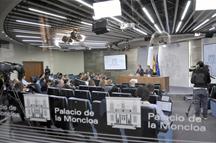 Pool Moncloa / JM CuadradoThe Council of Ministers, with the aim of continuing to guarantee the normal functioning of institutions in Catalonia, agreed to adopt a new procedure to speed up the management of the payment of salaries to public servants that provide services in the Autonomous Region of Catalonia.
Pool Moncloa / JM CuadradoThe Council of Ministers, with the aim of continuing to guarantee the normal functioning of institutions in Catalonia, agreed to adopt a new procedure to speed up the management of the payment of salaries to public servants that provide services in the Autonomous Region of Catalonia.
Following the ordinary meeting, the Council of Minister held another meeting, called pursuant to the agreement adopted by the Upper House of Parliament on 27 October 2017, approving the measures requested by the government within the scope of Article 155 of the Constitution.
Íñigo Méndez de Vigo highlighted the agreement whereby the project to re-industrialise the town of Flix (Tarragona) is considered to be in the general interest, an issue that was also underlined by the Government Delegate in Catalonia, Enric Millo, who reported at a press briefing in Barcelona on the issues of the Council of Ministers related to this region.
Anniversary of the Constitution
The Government Spokesperson began his press briefing following the Council of Minister by recalling that the 39th anniversary of the approval, by referendum, of the 1978 Constitution will be celebrated on Wednesday.
Íñigo Méndez de Vigo underlined the "sense of collective responsibility" of those who drafted the Constitution, as well as the "national consensus" in which this translated: on the one hand, the acceptance of the new institutions and the rules of the game; and on the other hand, pro-Europeanism. "We remain committed to this project", he declared "with its unity, a supportive Europe, the Europe of cohesion and the Europe of economic competitiveness".
Current affairs
The Minister for Public Works, Íñigo de la Serna, announced that in the first quarter of 2018, the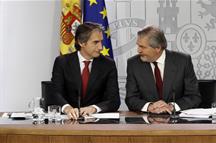 Pool Moncloa / JM Cuadrado works on the railway line in Canfranc will be put out to tender for an amount in excess of 70 million euros of joint financing from the European Union and Central Government. During this same year, the works may begin on some of the stretches.
Pool Moncloa / JM Cuadrado works on the railway line in Canfranc will be put out to tender for an amount in excess of 70 million euros of joint financing from the European Union and Central Government. During this same year, the works may begin on some of the stretches.
Íñigo de la Serna stressed that at present, no licence can be issued for VTC transport because the limits on this type of licence for every 30 taxis has been exceeded in all the autonomous regions. These authorisations, he explained, which are being validated by judges correspond to the situation outstanding for the period 2009-2013.
The minister and Government Spokesperson argued that any possible constitutional reform, to which end a committee has been set up in the Lower House of Parliament, should be carried out "with realism and responsibility", and have a similar consensus to that reached back in 1978 and that all the parliamentary groups should take part in this process.
As regards the announcement by Podemos to lodge a claim against the unconstitutional nature of the application of Article 155 of the Constitution in Catalonia, Íñigo Méndez de Vigo expressed his surprise at lodging a claim before the Constitutional Court about an article "that is contained in the Constitution" and described this decision by the General Secretary of Podemos, Pablo Iglesias, as one more example of his actions as an "appendage of the pro-independence parties".
Non official translation





